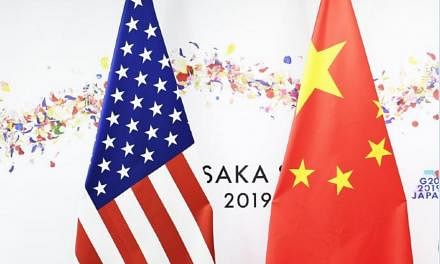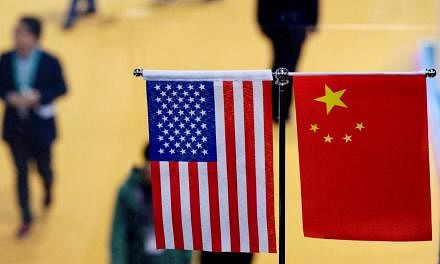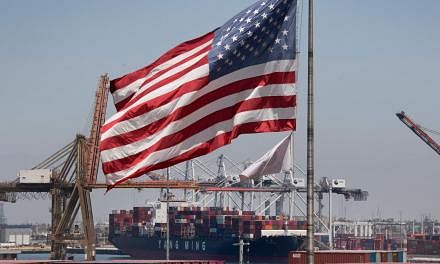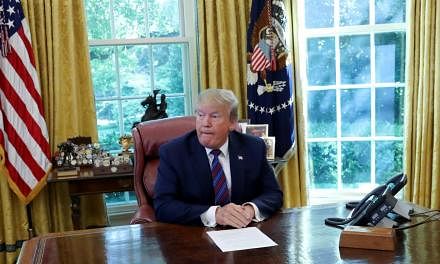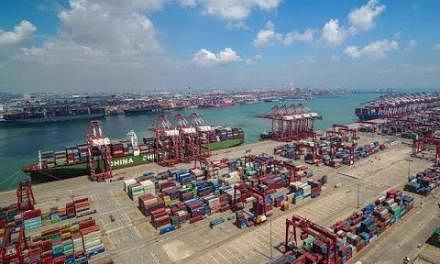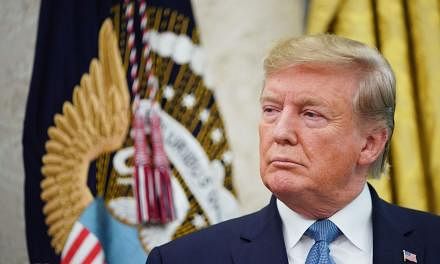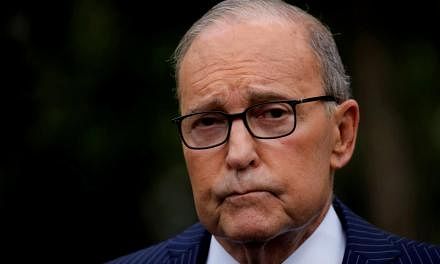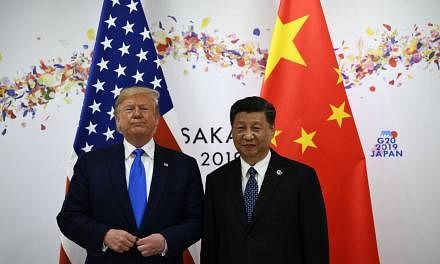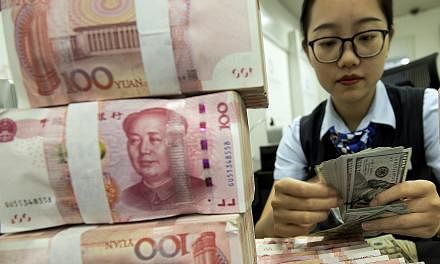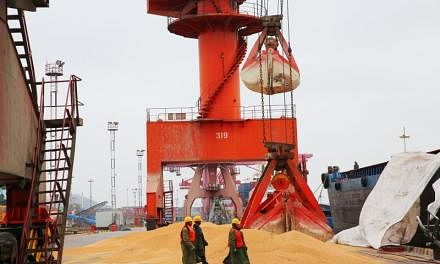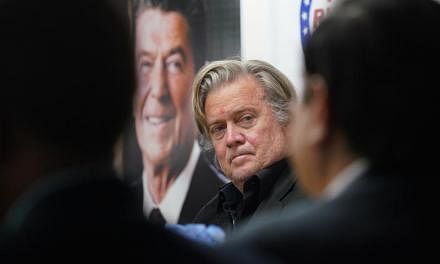SOMERVILLE (WASHINGTON POST) - Housed in a 19th-century meatpacking plant, Formlabs boasts all the accoutrements of American high-tech success: exposed brick walls and ductwork, a morale-boosting pool table, and plenty of young employees hammering away at laptops.
The maker of desktop 3-D printers, which can produce everything from dentures to Tesla car parts, is the kind of company that President Donald Trump once said must be protected from Chinese investors seeking American technology secrets.
But Formlabs' eagerness to accept funds from a Chinese investment firm backed by the country's government shows why any attempt to insulate the American technology sector from an economic adversary risks damaging the very industry it seeks to protect.
On Sunday (May 20), one day before he was due to recommend to the White House new limits on Chinese investments in high-tech US industries, Treasury Secretary Steven Mnuchin announced instead that the trade war with China was on hold.
Other administration officials continue to push for constraints on China's ability to buy into US technology companies.
"As this process continues, the US may use all of its legal tools to protect our technology through tariffs, investment restrictions and export regulations," US Trade Representative Robert Lighthizer said shortly after Mr Mnuchin's comments.
"Real structural change is necessary. Nothing less than the future of tens of millions of American jobs is at stake."
The House and Senate also are moving forward with legislation that would intensify scrutiny of investments from countries such as China.
As administration officials duel, the stakes are huge for American technology companies, which are increasingly reliant on Chinese manufacturers, customers and money to grow.
Corporations such as Apple, Cisco and Qualcomm all make key products in China, while Chinese investment in the US technology sector has grown rapidly during the past four years, amounting to nearly US$13 billion (S$17 billion) in almost 100 deals, according to the Rhodium Group, a New York-based consultancy.
But overly broad limits on investment from China, after 40 years of ever tighter integration between the US and Chinese economies, could harm companies such as Formlabs.
For them, Chinese investment offers access to valuable networks of suppliers and customers in a fast-growing market - along with ready cash.
"This is really a global industry. Any truly tech industry is global," said Ms Max Lobovsky, Formlabs' chief executive. "I don't think it would be possible if you drew a circle around the US and said 'everything has to come from here'."
Even as the president in late March was accusing the Chinese government of investing in American start-ups to gather "cutting-edge technologies and intellectual property", a top Chinese state-backed venture capital firm was taking a multimillion-dollar stake in Mr Lobovsky's company.
Shenzhen Capital Group, which invested in Formlabs' recent US$30 million funding round, was one of China's first venture capital firms when it was launched in 1999 by the Shenzhen government. Today, the local government still owns more than 28 per cent of the group.
Administration officials worry that such state-backed Chinese enterprises could outbid private-sector investors for stakes in US companies, giving China access to advanced technologies it lacks.
Mr Lighthizer said earlier this month that it would be "madness to let state capitalism come in here and buy our technology".
Shenzhen Capital insists that it does not take orders from the Chinese government,which wants to develop its own 3-D printing industry, and that it invests solely to make money. "The main goal of our investment in Formlabs is capital appreciation and reasonable return" after the initial public offering, the group told The Washington Post.
For privately held Formlabs, the Chinese money is only part of the story.
The company, which Mr Lobovsky said is roughly profitable, is doing well in the United States and Europe but lags behind in Asia. The US$30 million raised in April from Shenzhen Capital and four other investors will fund new product development and expansion into China and other Asian markets, the company said.
The technology of 3-D printing has long been used to produce manufacturing prototypes and parts. In recent years, it has spread to surgical guides, hearing-aid shells and larger items such as bus-stop shelters and simple homes.
The technology also has defence applications, including aerospace components such as jet engine nozzles. The US Navy is considering 3-D printers to produce spare parts aboard vessels at sea.
Formlabs' flagship Form 2 model is assembled in Hungary with components from China, Taiwan, Japan and the United Kingdom and uses Ohio resin as the raw material for printed products.
The company buys precision machined parts, such as small motors, from China and produces printer accessories there.
Chinese manufacturers are critical to Formlabs' hopes of adapting 3-D printing for use in mass production, Mr Lobovsky said, and Shenzhen Capital's extensive government and business connections could be critical to reaching those manufacturers.
"It's a networking, relationship-based business culture to a large degree," Mr Lobovsky said. "People in China do care about government connections."
Mr Lobovsky has made several trips to China, where he has seen highly automated factories that excel at handling delicate components and fulfilling custom orders. Chinese suppliers are especially skilled at producing injection-moulded plastic parts, such as the tank that holds the printer's resin and resembles fancy Tupperware.
"It's not just that it will cost five times the price in the US," he said. "You can't even get the same parts made."
Mr Lobovsky, 30, the son of two engineers, grew up in New Jersey two miles from the legendary Bell Labs. He started Formlabs nearly six years ago with two graduate school classmates at the MIT Media Lab. They raised US$500,000 in preorders in their first 24 hours on the Kickstarter crowdfunding platform.
Since then, they have turned to inexpensive components and powerful software to reduce the cost and size of their units. Where 3-D printers were once hulking US$100,000 machines, Formlabs sells US$3,350 desktop units.
That price - which Mr Lobovsky said would be far higher without access to Chinese suppliers - has attracted big-name customers such as New Balance and Apple. It has also opened new markets in smaller businesses such as dental offices.
The company has about 400 employees and plans to increase the workforce by 60 per cent this year.
For Formlabs, China is a source of potential competitors as well as customers. Mr Lobovsky found a visit last fall to drone producer DJI in Shenzhen "inspiring and a little scary", he said, evidence that China is no longer content to cede the most advanced industries to the United States.
"There's going to be more of them, and they're going to come in industries like that...new industries," he said.
Mr Trump has threatened to impose tariffs on US$150 billion in Chinese imports to pressure Beijing to abandon its campaign to acquire US technology. The Treasury Department was expected to issue recommendations on restricting future Chinese investment but now may only issue a perfunctory account of its progress doing so.
Meanwhile, lawmakers are considering proposals that would enable a Treasury Department-led inter-agency committee to veto minority investments and other deals involving foreign investors that have escaped review in the past.
The US venture capital industry - which funnels money and expertise into start-ups in hopes of a big payday when they go public - has objected, fearing that the legislation would require even passive, or purely financial, investors to seek government approval.
"It will hurt start-ups dramatically. It will slow down innovation in companies," said Mr Weijie Yun, founder and managing partner of Tyche Partners, which led Formlabs' recent investment round.
US officials say that the Chinese government is determined to dominate technologies that will be essential to future economic and military prowess, including artificial intelligence, robotics, quantum computing and 3-D printing.
Under the Made in China 2025 programme, the government is spending US$300 billion in subsidies to supplant foreign technology suppliers with homegrown alternatives.
"A core part of the Chinese Made in China 2025 plan is acquiring intellectual property from US technology companies, and increasingly they're trying to do that through venture capital," said Mr Rob Atkinson, president of the Information Technology and Innovation Foundation.
Shenzhen Capital said the government programme is irrelevant to its investment decisions.
"In my discussions, the China 2025 was never mentioned, not even once," said Mr Yun, a Shanghai-born US citizen. "From my engagement with them, they are purely financially driven."
Mr Lobovsky said that concerns that Chinese investors are after technical secrets rather than profits are misplaced. Shenzhen Capital's involvement in Formlabs is "strictly a financial investment" and includes no rights to the company's proprietary secrets, he said.
The National Venture Capital Association said the Pentagon overstates the amount of Chinese investing in US technology industries.
Mr Scott Kupor, a venture capitalist and NVCA chairman, estimates that Chinese investors account for less than 5 per cent of total venture capital commitments.
"It's definitely different, but that doesn't mean it's necessarily sinister," Mr Lobovsky said of his dealings with Shenzhen Capital. "They don't hide at all that they're investing government money, and they talk about having mandates about how much to invest in the US versus China and in different industries."
Mr Atkinson said today's passive minority investment could expose companies such as Formlabs to pressures to take a local partner and share technical secrets as they deepen their involvement in China.
Mr Lobovsky said he recognises the risks. But as the son of emigres from the Soviet Union, he said that he was conscious of the need to balance patriotism and pragmatism.
"They basically had to fight to leave a totalitarian, leftist regime for better opportunities," he said of his parents. "I'm extremely proud that they did that and that I got to grow up here. What we've done is certainly only possible here."

